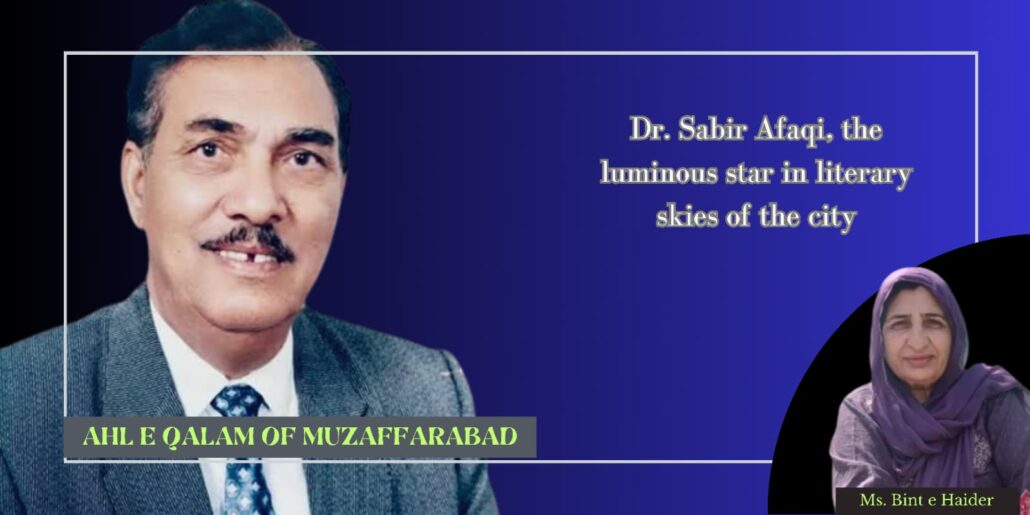
Bint e Haider
Rasool Hamza eloquently speaks of the vast expanse within the hearts of the Dagestani mountains, where a perpetual melody resonates. He vividly describes a house in this village, seemingly indistinguishable from its neighbors. Yet, within this humble abode, two poets have soared with their poetic names spreading across the world.
Muzaffarabad, my city, is also a mountainous city surrounded by hills, akin to other hilly cities. Some have rugged winding roads leading to homes, where residents form communities based on their village, city, or homeland. A local poet beautifully expressed that our city is like a gem in the mountains, a ship of waves in the thousands. Muzaffarabad is indeed a surrounded city, where the confluence of Neelum and Jhelum gives it a unique identity. Its residents have also strived to enhance its fame.
Similar to Muzaffarabad, this city is surrounded by hills and has become renowned for the efforts of individuals like Daulat Ram Sharma. Even before 1949, he gave ho personal interests and privileges to illuminate the city with the blessings of electricity. Despite being requested by Maharaja Hari Singh, he and his family, did not go to Srinagar.
In 1949, Muzaffarabad was illuminated, and from that time onwards, it continued to illuminate the city until electricity reached Muzaffarabad through WAPDA.
Though Muzaffarabad shone with light in 1949, the city continues to shine with bright stars who continue to illuminate the city with their radiant colours and their intellectual brilliance and the most shining star among these names is Dr. Sabir Afaqi.
Born in 1935 in Gohadhi near Dogra-controlled Thannamandi in present-day Azad Kashmir, Dr. Sabir Afaqi is a distinguished scholar and literary figure.
His early education, rich in Quranic studies, was undertaken at home, primarily guided by his father, Ali Muhammad. Despite the challenges of distance, he acquired his primary education at Abu Dhabi High School, later completing his matriculation at Bhimber High School. Subsequently, he served as a teacher at Bhimber High School.
Dr. Afaqi continued his education privately, delving into studies under scholars like Maulvi Fazil Manshi Fazil. He pursued further studies in Persian, Urdu, and Arabic, culminating in an M.A. degree. His academic journey extended to Iran, where he earned a doctorate in Persian language and literature. In 1965, he entered the realm of matrimony and, together with his wife, raised three daughters and a son.
Leaving his ancestral village in 1962, Dr. Afaqi settled in Muzaffarabad, specifically in the Plate area, where he resides to this day. His remarkable journey reflects not only academic achievements but also a commitment to promoting education and contributing to the literary and cultural heritage of Muzaffarabad.
Dr. Sabir Afaqi initiated his writing career with various articles and contributions to different magazines and newspapers. He also wrote extensively for Radio Azad Kashmir, including features, scripts, dramas, and various programs. During the Iranian Revolution, he authored a book named “Gul Hai Kashmir,” inspired by the name “Gul Hai Kashmir” used during that period.
Dr. Afaqi’s literary works span over 60 creations, showcasing his unique ability to write in diverse languages and genres. His writings cover history, religion, literature, research, poetry, criticism, autobiographies, and more, in languages such as Urdu, Persian, English, Punjabi, and Gujarati.
Some notable titles among his vast array of works include “Tareekh Kashmir Islam Ahad Mein,” “Iqbal Aur Kashmir,” “Paigham Inqilab,” “Khatoon Ajam,” “Qurratul Ain Tahira,” “Muzaffarabad,” “Hamare Jahan Ka Dard,” “Shehr Tamanna,” “Ahad Watak,” “Basharat Zahoor,” “Gujari Zaban Aur Adab Mein,” “Phal Phulghari,” “Kair Kyari,” “Sa Mujho Khilado,” “Zahoor Mehdi Aur Maseeh,” and “Gul Hai Kashmir.”
Apart from these, Dr. Afaqi has translated historical works such as “Raj Tareekh Kashmir Ranginama” into “Jalwa Kashmir.” His unique historical accounts of Muzaffarabad city, namely “Muzaffarabad” and “Tareekh Muzaffarabad,” have gained recognition.
In 2009, “Chin Mein Muzaffarabad” was published, adding another gem to his collection. Dr. Sabir Afaqi’s profound contributions to literature, history, and culture make him a luminous star that continues to shine brightly.




